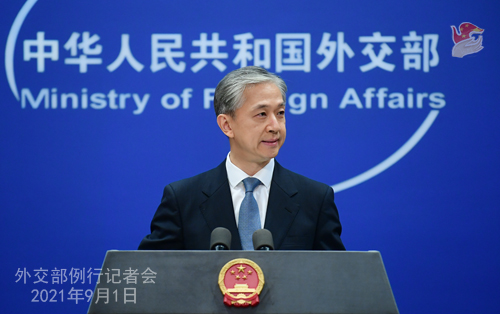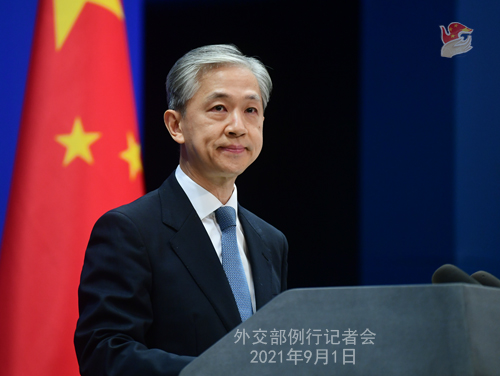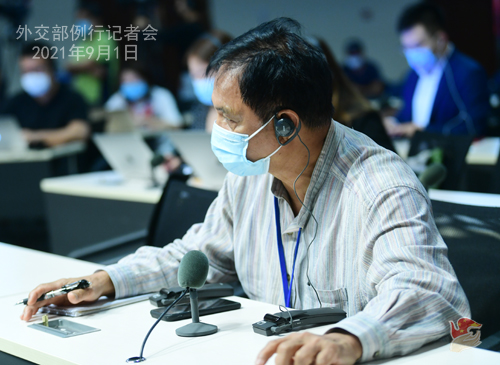
Bloomberg: An American Chamber of Commerce in Chengdu has said it has closed, although it's not clear what the issue is. Does the foreign ministry have information on the matter and why AmCham Southwest abruptly closed?
Wang Wenbin: I'm not aware of what you mentioned and would refer you to the competent authorities. I would like to state in principle that China is a country based on rule of law. All foreign organizations based in China must act within China's legal framework.
Global Times: According to reports, terrorist attacks near the Kabul airport on August 26 killed and injured hundreds of people. Some of the injured revealed that US forces shot at civilians after the blasts, which led to more casualties. On August 29, US forces based in Afghanistan launched drone attacks on a civilian residence on counter-terrorism grounds and left ten civilians dead. The youngest victim was only two years old. What is your comment?
Wang Wenbin: China has noted relevant reports. Public reports show that the US killing of innocent people in Afghanistan happened frequently.
In 2002, US Air Force carried out an airstrike on a wedding in Uruzgan province, which claimed the lives of dozens of civilians and injured more than a hundred. In 2008, US troops attacked a village in Herat province, which killed nearly a hundred civilians including 50 children and 19 women. In 2010, NATO forces bombed Daykundi province, which took at least 33 lives. In 2015, an Afghan anti-narcotics police force on a mission was attacked by NATO fighter jets and 15 officers died. In 2019, a US drone strike mistakenly killed at least 30 Afghan farmers in Nangarhar province. A former US soldier and a drone pilot said in a testimony for a UN expert committee that US drone strikes were purely killing for the sake of killing, and that the US airstrikes led to far more Afghan civilian deaths than the official statistics of the US government. Data shows at least 47,245 Afghan civilians died by April 2020 in the war in Afghanistan launched by the US.
US forces have withdrawn from Afghanistan. But the murder of civilians by the US forces and their allies over the past 20 years must be investigated thoroughly and the killers must be brought to justice. The lives of the Afghan people should be protected and the human rights of the Afghan people should be defended. At stake is international justice and the rule of law and world human rights development.

Kyodo News: According to reports, US Special Presidential Envoy for Climate John Kerry has arrived in Tianjin. Could you confirm if talks between him and China's Special Envoy for Climate Change Xie Zhenhua have started? What expectations does China hold for the talks?
Wang Wenbin: I assume you've noted the information released by China's Ministry of Ecology and Environment and the US State Department. At the invitation of the Chinese side, Special Envoy Kerry is visiting China from August 31 to September 3. During the visit, China's Special Envoy for Climate Change Xie Zhenhua will hold talks with him in Tianjin and exchange views on issues including China-US climate change cooperation and COP26 of the UNFCCC.
As to the specific question you asked, please stay tuned. We will release relevant information in due course.
CCTV: According to reports, sources of the Afghan Taliban said on August 31 that the talks on the establishment of a new Afghan government were concluded, and they will announce the formation of the new government on September 3. Do you have any comment? Will China recognize the new Afghan government?
Wang Wenbin: Afghanistan is turning a new page in its history, facing both opportunities and hopes as well as challenges and difficulties. The Afghan people, having suffered so much, are now standing at a new starting point for national peace and reconstruction. The international community is closely following developments including the formation of a new government in Afghanistan. China sincerely hopes that all parties in Afghanistan will echo the aspiration of the Afghan people and shared expectation of the international community, build an open and inclusive political structure, adopt moderate and prudent domestic and foreign policies, make a clean break with all terrorist groups and live in good terms with other countries, especially its neighbors.
Chairman Mao Zedong once said that "Afghanistan is a heroic country and has never surrendered. China and Afghanistan are friendly countries. China does not want to harm Afghanistan, and Afghanistan does not want to harm China. The two countries always support each other". China will as always pursue a friendly policy toward the entire Afghan people, respect Afghanistan's sovereignty, independence and territorial integrity and will not interfere in the country's internal affairs. China will continue to provide utmost assistance to Afghanistan for an early realization of peace and reconstruction.

NBC: Going back to John Kerry's visit. I'm wondering if China thinks John Kerry's visit has potential significance for China-US relations beyond climate change issues? In your view, what are the areas of relations that can benefit from direct dialogues like this?
Wang Wenbin: China and the US have differences on some issues. At the same time, we share common interests in a broad range of areas including climate change. The two sides should maintain dialogue and communication and conduct mutually-beneficial cooperation on the basis of mutual respect while properly managing differences through equal-footed consultation so as to bring the bilateral relations back to the track of stability and development.

